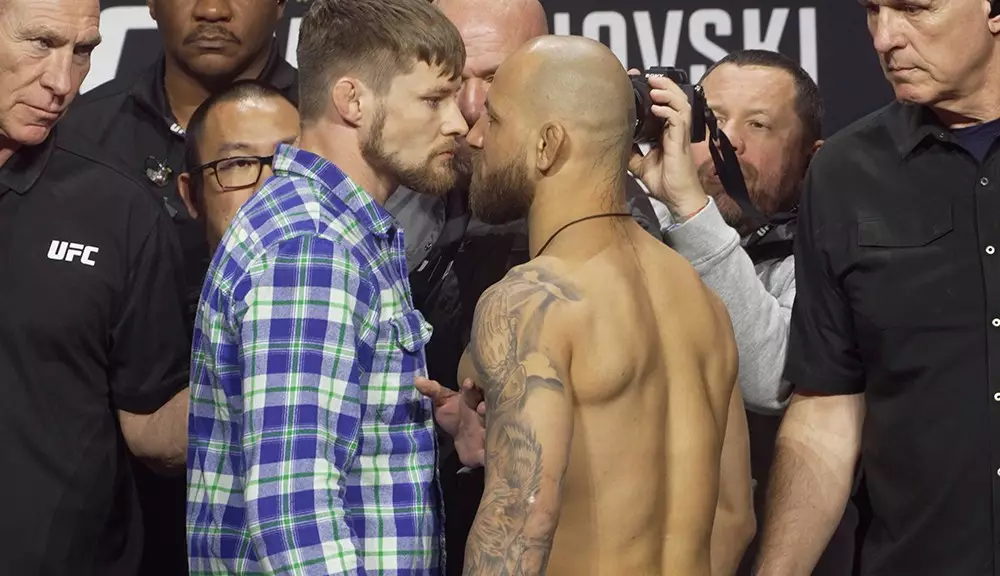In the realm of professional fighting, both physical prowess and mental fortitude are paramount. However, for Bryce Mitchell, as he prepares to step into the octagon at UFC 314, a different kind of battle has taken precedence—one that rages in the confines of his mind. Mitchell’s declaration that he has been plagued by demonic dreams paints a vivid picture of an athlete wrestling with psychological challenges in addition to the physical bout that awaits. His anxieties reveal more than mere pre-fight jitters; they embody a deep struggle between his faith and the fears that threaten to overtake him when the lights dim and the crowd roars.
An Open Call for Divine Intervention
Mitchell’s public request for prayers from his fellow Christians highlights a profound reliance on faith as both refuge and source of strength. The world of mixed martial arts can often be a solitary journey—a path fraught with temptations and vulnerabilities. From his platform, Mitchell vulnerably shares that he is not just contending with an opponent in the cage, but also facing personal demons that expose the fragility in the armor of any competitor. By reaching out for communal support, he not only acknowledges the psychological aspects of fighting but invites a collective responsibility to uplift each other through prayer.
His assertion, “Where I am weak, the Lord is strong,” exemplifies an intriguing juxtaposition of belief and the human experience. The notion of divine strength in facing one’s failures and insecurities is powerful. It underscores a critical aspect of many athletes’ journeys: the need for an anchor, especially when confronted by life’s shadows.
The Showdown and Its Shadowy Undertones
The build-up to his fight with Jean Silva is laden with drama, amplified significantly by the outburst during the March 7 press conference. Silva’s mockery and unsportsmanlike chants not only escalated tensions but also seemed to pull at the threads of Mitchell’s mental state. Here lies the fascinating duality of the combat sports narrative—while physical confrontations are a tangible reality, the psychological gamesmanship often looms larger in shaping the athletes’ mindsets going into battle.
Mitchell’s quirky comments outside of the context of fighting, such as views on global geography or controversial historical figures, have painted him as a polarizing figure. These comments may reveal deeper complexities within his character—his search for identity and a platform to assert his beliefs. At UFC 314, this clash of ideologies might play out not only physically but psychologically, where participants become more than just fighters; they transform into symbols of the contests of good versus evil, belief versus skepticism.
Fighting for More Than Glory
Propelled by a burgeoning faith-led purpose, Mitchell claims that his motivations are now transcendent; he doesn’t merely fight for trophies or glory, but for something far greater. Herein resides a compelling narrative about the trajectory of an athlete’s life—one that shifts from self to service in a quest for meaning. The Octagon becomes less a battleground for supremacy but rather a spiritual arena where he believes he will exorcise the demons not just from his own psyche, but from Silva as well.
His belief that Silva embodies a man possessed involuntarily positions the fight as a metaphysical clash—one that transcends physical strength, where the soul’s vigor can dictate the outcome. Such convictions can infuse a fighter like Mitchell with unparalleled tenacity, galvanizing his resolve to rise above not only his opponent’s attacks but also the inner turmoil that has plagued him.
Beyond the Cage: The Larger Implications
Mitchell’s articulation of his inner battles invites a broader conversation about mental health in the high-pressure world of sports. While his predicaments may be grounded in his faith, the underlying message resonates universally: athletes, regardless of their field, wrestle with mental and emotional hardships that accompany their journeys to the pinnacle of success.
Whether it’s the spotlight in the octagon or the solitude of their expectations, the dualities make it imperative for athletes to seek support and acknowledge not only their physical needs but their mental health as well. In that regard, Mitchell’s candidness shines a light on the human experience, combining elements of combat, vulnerability, and spiritual exploration in sports that often focus solely on physicality.

